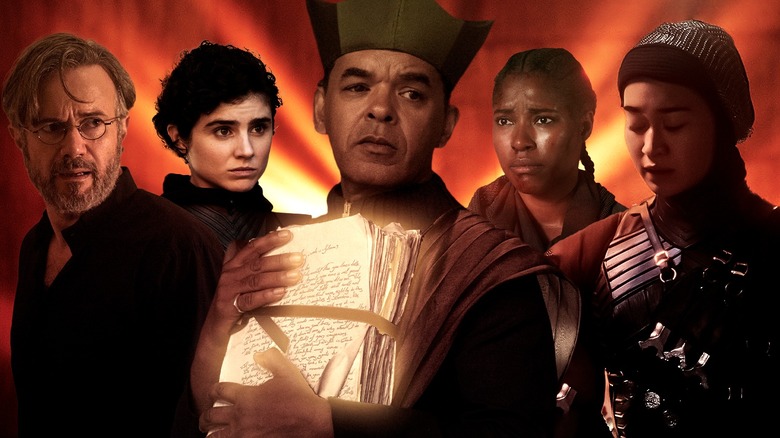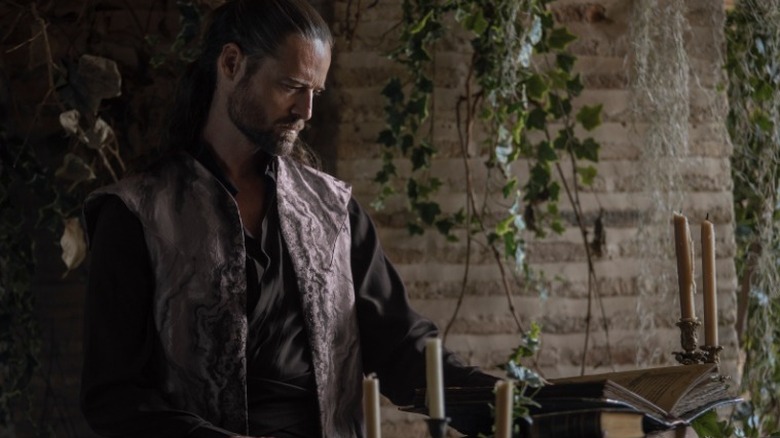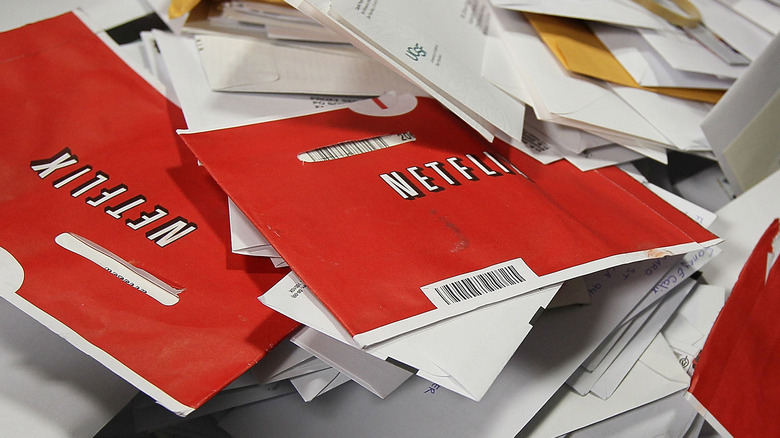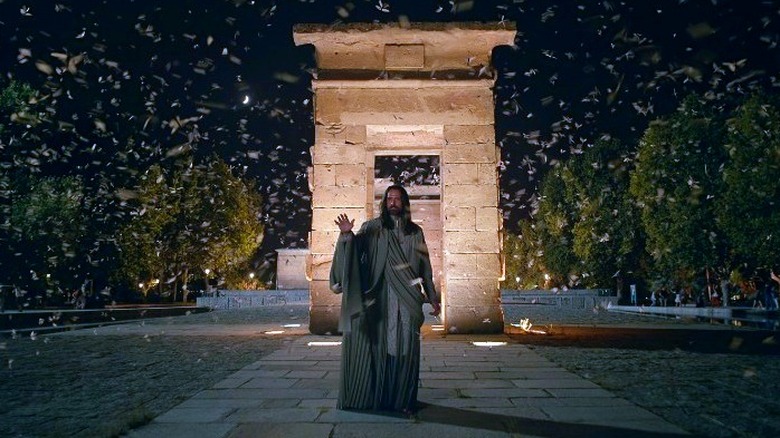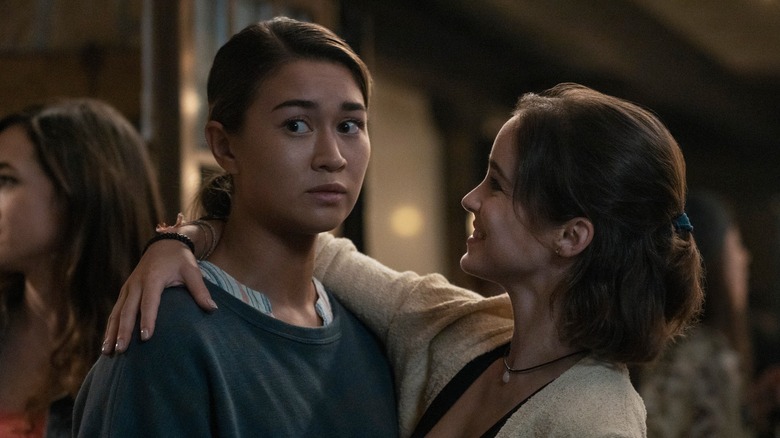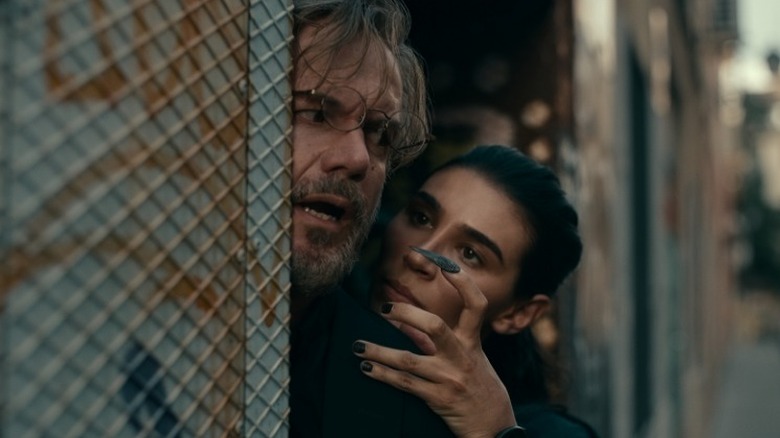An Open Letter To Netflix - Bring Back Warrior Nun Or Else
Dear Netflix,
Thank you for your interest in our upcoming "Major Corporations that Aren't Terrible Liars Prize." The Universal Media Foundation for Renewal Logistics has received an unprecedented amount of submissions this year, and in an effort to ensure each candidate receives a fair and thorough evaluation, we've added an extra step to our review process. As you know, UMFRL's "Major Corporations that Aren't Terrible Liars Prize" has been awarded just once every twenty years since our organization's inception in 1945. Finding worthy candidates is never easy, but for the 2025 cycle, we're more determined than ever to actually award this coveted seal of approval. Thus, we've decided to give applicants 90 days to remedy — or at the very least, own up to and apologize for — their bold-faced lies.
We're writing to inform you that, at this time, Netflix is in danger of being rejected outright. Though we recognize and appreciate the contributions that your company has made to the mechanics of film and television consumption, we have several serious concerns regarding your decision making as of late, as well as your response to complaints about that decision making.
You are, of course, welcome to decline taking any further action regarding your candidacy, but we strongly suggest you consider some of the recommendations and inquiries outlined herein, including: Adjusting your definition of (and metrics for determining) "success," refraining from any and all further attempts to gaslight your own customers, and, most importantly, bringing back "Warrior Nun."
Warrior Nun's cancelation is part of a terrible Netflix trend
Netflix, no one at UMFRL thinks your job is easy. We understand that in the wake of your recent decline, the decision to lay-off 450 employees, crack-down on password sharing, and pour millions of dollars into producing lackluster "blockbusters" — rather than rethinking the approximate $10 to $40 million dollars in salaries, stock options, and bonuses that your execs continue receiving (per Variety) — was, indeed, a difficult one. And we're certain that someone at Netflix is saddened by the cost-effective detritus that prevents quality original programming from making it past the nigh-inevitable two season expiration date. We're not blind to the uphill battle you face by no longer having the monopoly on streaming, and the world has gone back to work. None of these things, however, excuse your counterproductive behavior.
Before we reiterate our issues with your cancelation and response (and it would be reiterating, since the expansive "Warrior Nun" fandom has done an exquisite job speaking for itself already) we ask that you consider the following:
1. That this is, and isn't, about "Warrior Nun." While Simon Barry's series is the most egregious example of your aforementioned bad acts, it's hardly the only one.
2. We believe there's more at stake here than the numbers can speak to, and it's for this reason that we write you now.
3. The odds of you bringing back the series are, we realize, approximately zero, much like the odds that we'll actually consider you for the "Major Corporations that Aren't Terrible Liars Prize." But if this is an exercise in futility, it's one in which we fervently believe. And as our research suggests, there was a time when you, too, knew what it meant to believe in (and stand by) your service and its subscribers.
Netflix used to correct its mistakes
Netflix, you don't need us to retrace your admittedly admirable rise from underdog startup to the so-called King of Content. After all, Shawn Cauthen and Gina Keating's "Netflix vs. the World" already did that. Still, it's difficult to ignore some of the more glaring gaps between your recent behavior and the commitment to customer service, honesty, and self-awareness depicted in the 2020 film.
As the documentary explains, a disc mix-up back in 1998 led to hundreds of Netflix subscribers accidentally receiving porn. Following the scandalous snafu, Netflix apologized so profusely and sincerely that it actually increased the popularity of the brand. At a later point in your epic David-becomes-Goliath story, viewers are reminded that, in 2011, then-CEO Reed Hastings issued a similarly humble apology for price increases and the ineptitude with which Netflix rolled out Qwikster (via YouTube).
We'll return to that debacle, but for now, we'd ask that you think about the degree to which these responses differ from co-CEO Ted Sarandos' defensive remarks in Bloomberg: "We have never canceled a successful show," he said in January, adding, "A lot of these shows were well-intended but talk to a very small audience on a very big budget. The key to it is you have to be able to talk to a small audience on a small budget and a large audience at a large budget."
Which brings us to "Warrior Nun."
Some Warrior Nun data for the Netflix robot
Netflix, "Warrior Nun" wasn't just well-intended. It was well-attended, despite the $0 that went into informing subscribers of its existence (per CBR). We're almost certain you're well aware of the series' massive following, but we thought it best to provide you with some numbers, in case The Algorithm is also listening:
- 10 million+: The number of #savewarriornun tweets as of February 19th, 2023
- 115,000+: The continually growing number of signatures on the Renew Warrior Nun for Season 3 petition
- 3: The number of major cities (L.A., New York, and London) that will house fan-funded #SaveWarriorNun billboards as of February 20th, 2023
- $42,000: Current donations made to the series' GoFundMe, which will "fund other projects and charity work in the name of the Warrior Nun fandom"
- 22.4X higher: Parrot Analytics' assessment of demand for "Warrior Nun" vs. the demand of the average TV series in the U.S.
- 98.1X higher: Parrot Analytics' assessment of demand for "Warrior Nun" vs. the demand of all action and adventure titles in the U.S.
- 5: The approximate number of original scripted series invested in LGBTQ+ representation — not just LGBTQ+ presence — that Netflix canceled between 2022 and 2023 (via PinkNews)
- 16+: The approximate number of female-led, (often) YA original scripted series that Netflix has prematurely canceled in recent years despite solid viewership (via Forbes)
We're not naive, Netflix. We know exactly what your definition of "successful" entails: that is, a series must instantaneously appeal to the largest demographic possible — and be watched in its entirety, also fairly immediately, by every viewer — in order to justify renewal (per Wired). Barring that, "success" means a show that costs almost to nothing to make, like a mindless reality TV dating series, or whatever "Is it Cake?" is. Therein lies the problem.
Netflix, this is the real cost of profit
At UMFRL, we believe that innovation without dedication to quality, and without a fierce determination to continually meet a societal need, isn't innovation at all. Fumbling around looking for the next "Stranger Things," pouring money into para-blockbusters, kicking broke college students off their parents' Netlfix account, and cranking out dozens of true crime serial killer narratives (some of which cover the exact same subject matter) isn't innovation — it's stagnation.
"Stranger Things" already exists. Disney+ already won at Marvel, so making faux-Marvel action movies is... sort of desperate. Broke college students will find something else to watch, and as for Netflix's serial killer content, it's safe to say none of it hs offered any new or meaningful insight on real-life events. "Warrior Nun," on the other hand, was innovative. And to say it met a societal need would be an understatement. In addition to depicting a range of distinct, fully fleshed-out, and multi-dimensional sapphic characters, it openly explores the intersection of science and faith, the distinction between faith and religious institutions/mainstream religion, and the under-acknowledged struggle that religious LGBTQ+ individuals face.
Data can reveal many things, Netflix. But there's a lot that numbers and algorithms can't speak to, such as, how an over-reliance on premature cost-benefit analyses will affect a company's immediate relevance and historic impact. Consider what Netflix customers have to say about the value and importance of "Warrior Nun." And Netflix, before you put on those defensive, anti-fandom pants, be reassured: The "Warrior Nun" community — like the series itself — not only attracts a wide range of viewers (as illustrated briefly and endearingly throughout Reddit), but hasn't even spiraled into the toxic nonsense one typically associates with zealous fandoms.
Your move, Netflix. Bring Back Warrior Nun
"Warrior Nun" fans are different from other fans. Maybe it's the series' rejection of militant fanaticism. Maybe it's just that "Warrior Nun" fans have objectively better reasons to band together and protest than, for instance, an adaptation straying from its source material. Either way, they're far from the "very small audience" to which your co-CEO's comments refer. Both literally and idiomatically speaking, these Halo Bearers are big. Since we assume (read: hope) that someone at Netflix is paying attention to the millions of "Warrior Nun" fans on social media, we'd like to direct your attention to an actually very small, but nonetheless revealing, sample of reactions to its cancelation:
Twitch streamer SiwaPyra speaks openly about the series' reach: "I've had religion my whole life, and that led to some difficulties when I came out because of that historic clash between faith and sexuality. It can be lonely to walk both worlds [...] I know so many other people with similar stories, and I think what people really loved about 'Warrior Nun' was that it represented them, whatever their experiences" (via NME).
Paste's Anna Govert writes, "Netflix picks and chooses when it wants to champion representation — but oftentimes the stories of sapphic women and women of color find themselves on the receiving end of Netflix's cruel axe more than any other group."
And referring to that same bottom line, as well as Netflix's short-sighted calculation of it, a fan on Reddit notes, "You can't alienate entire demographics time and again, tell them they're not worth providing content for, and expect them to hang around."
All of which brings us back to the purpose of this letter.
Correct your mistake, Netflix, or confess your sins
The "Major Corporations that Aren't Terrible Liars Prize" should be one of the easiest awards to come by, as it requires, simply, that you refrain from being full of it. You don't have to be a good corporation, a charitable corporation, or even a corporation that pays taxes. The sum total of what we ask is that you not say one thing while very clearly doing another. But the fans and outlets are onto you, Netflix. "Warrior Nun" has a massive following, and unless you can provide evidence contradicting Simon Barry's assessment that it's an affordable series to produce (per NME) we can only assume the "big budget" issue doesn't apply, either.
This isn't another Qwikster hiccup. This isn't about dragging a market, kicking and screaming, into the 21st century. This is about inhibiting progress, putting instant profit over long-term relevance, treating your subscribers like knobs, and doubling down on a narrow definition of "success" that inevitably prevents series with more inclusive, diverse, and complex storylines from ever succeeding. It's one thing to know this and stand by it anyway. It's another thing entirely to know this, stand by it, and insist that's not what's going on. That, Netflix, is pure hogwash.
We'd like to thank you, once again, for your interest in our award, and reiterate that if you wish to move forward with your candidacy, your options are limited. Either bring back "Warrior Nun," or else ... admit the truth. If you refuse to correct your mistake, the least own up to it. What do you have to lose? What could the wrath of "a very small audience" possibly do to your numbers?
Warmest regards,
The UMFRL Prize Committee, with special thanks to The Halo Bearers.
